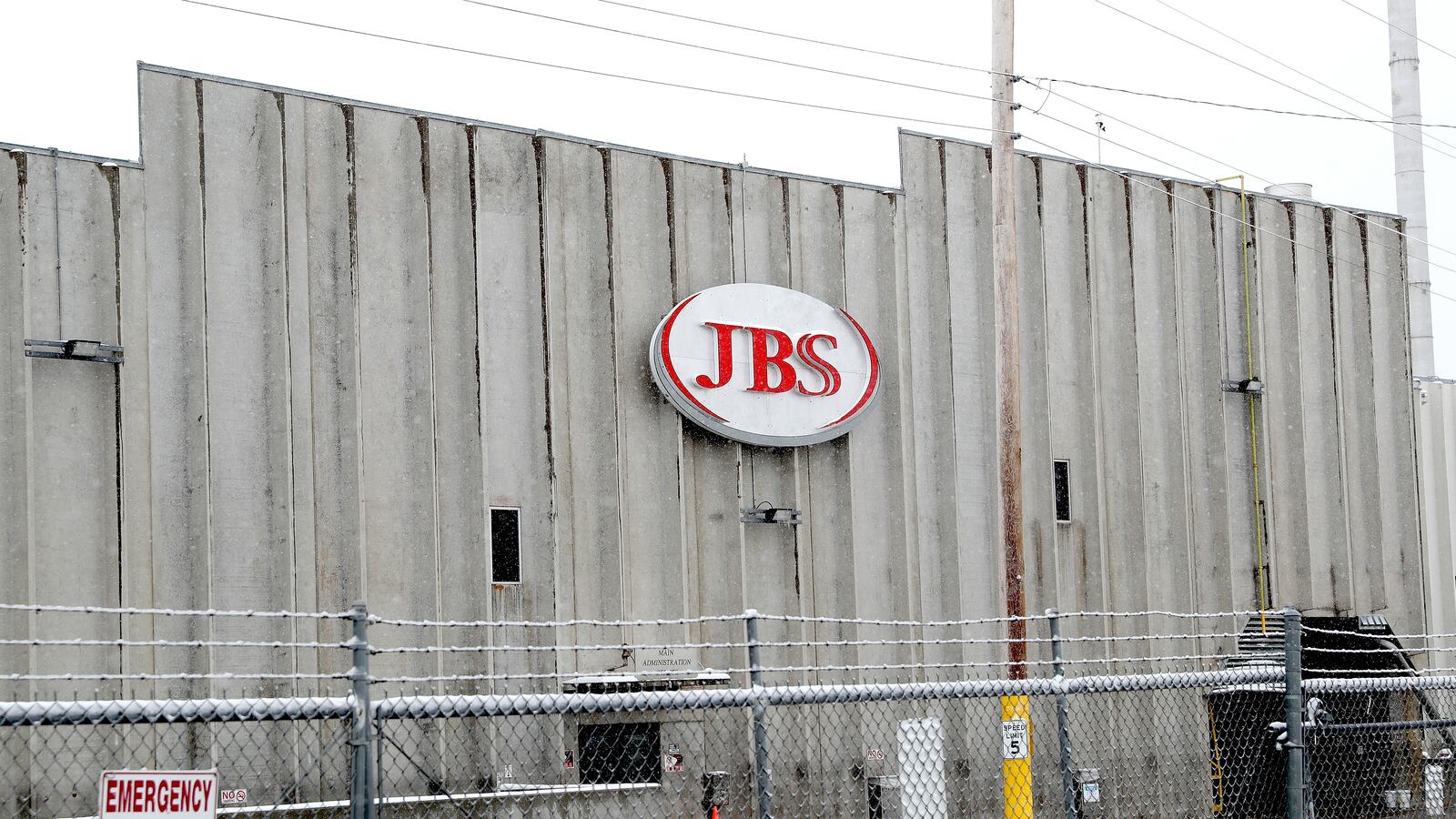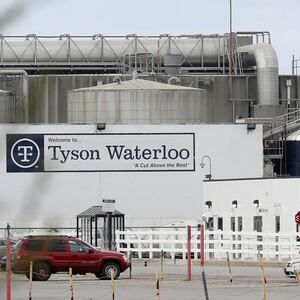Meat-plant workers in Colorado condemned local leaders on Wednesday for refusing to enforce new state-directed COVID-19 safety restrictions, even after hitting a “level red” designation over the region’s spiraling increase in coronavirus cases and dire hospital situation.
Colorado Gov. Jared Polis said on Tuesday that Weld County hospitals had only three available ICU beds, and no non-ICU beds left in its facilities, as reported by The Denver Post. Level Red restrictions include banning personal gatherings of any size, closing indoor dining at restaurants, recommending remote learning at high schools and colleges, and limiting office capacity to 10 percent. The state’s guide does not note a reduction in capacity at critical food-processing facilities under Level Red, and the governor’s office did not immediately respond to a request for comment on Wednesday from The Daily Beast.
In any case, the Weld County Board of Commissioners, all five of whom are Republicans, have indicated the state’s new designation for the region “does not change” their stance “with regard to enforcement of the state’s mandates.”
“Instead, [the] county government continues to do what it has done since March, which is promote and encourage residents and business owners to take individual responsibility,” the commissioners wrote in a news release, according to The Post.
In response, a local mayor has moved to restrict hospitals in his jurisdiction from treating Weld County patients, and in a rebuttal on Tuesday, the governor’s office released a statement condemning the board of commissioners.
“You’re either on the side of the virus or on the side of Coloradans,” said the statement. “To undermine—with no real authority—the state’s efforts to save lives ultimately amounts to dangerous freeloading and jeopardizes lives, small businesses, and jobs.”
Weld County is home to the JBS meat processing plant, which employs at least 3,000 workers, of whom at least 350 have tested positive and six have died from the virus since the pandemic began, according to the United Food and Commercial Workers Union. The plant, in Greeley, Colo., was a COVID-19 hot spot in April, and that deadly outbreak lasted five full months, according to The Greeley Tribune.
As of Wednesday, there was a second active outbreak at the facility, according to the union.
Kim Cordova, president of the union’s Local 7, which represents more than 27,000 workers in healthcare, meatpacking, and grocery services in both Colorado and Wyoming, said on Wednesday that the county’s “failure to protect thousands of Local 7 members, their families, and the county’s more than 324,00 residents is dangerous, irresponsible, and shameful, especially when there are very few hospital beds available.”
Weld County did not immediately respond to a request for comment from The Daily Beast on Wednesday. Local 7 also represents more than 200 workers at grocery chain stores and healthcare facilities in the county, all of which, along with meat-plant workers, are deemed essential by the federal government.
“Of the 20 ‘level red’ counties in Colorado, Weld County stands out,” Cordova said, adding, “The COVID-19 pandemic will not just go away in Weld County if local government does not take action.”
JBS’s Weld County plant made headlines last month when the company denied claims for several families of employees seeking compensation for deaths caused by COVID-19. The company is based in São Paulo, Brazil, and is the largest meat processor in the world.
“We have been and will continue doing all we can to protect our team members and to keep the virus out of our facilities,” said a statement from the company on Wednesday. “We have implemented hundreds of safety interventions during the pandemic to keep our Greeley team members and the community safe. We have aggressively implemented free, random surveillance testing of asymptomatic team members at our corporate offices and across our U.S. facilities, including our Greeley beef facility.”
“We are closely monitoring community case rates, community positivity rates, and internal testing data on a daily basis, in addition to partnering with the state to offer free testing to our workforce and their families,” the company said. “JBS USA also recently enhanced our health benefits to retroactively cover 100 percent of all COVID-19 related health expenses for our team members and their family members enrolled in our health insurance plan.”
A new study this week found that, early in the pandemic, up to one in 12 cases of COVID-19 were tied to outbreaks at meatpacking plants, emphasizing that hot-spot workplaces drive infection in surrounding communities. More than 100 such plants operated by Smithfield, Tyson, and others had significant outbreaks of the virus due at least in part to crowded working conditions.
The virus has infected more than 42,000 meatpacking workers this year, killing at least 221.
The study—at Columbia University’s School of International and Public Affairs and the University of Chicago’s Booth School of Business—concluded that data demonstrated “a strong positive relationship” between meatpacking plants and “local community transmission” in cases through late July, calling plants “transmission vectors,” which “accelerate the spread of the virus,” Bloomberg News reported.
Unsurprisingly, lawsuits have popped up in recent months to demand justice for the workers at such plants.
One lawsuit, filed in federal court last week, claimed that more than 1,000 employees at a Tyson Foods facility in Waterloo, Iowa contracted the virus, killing five of them before the plant was shut down on April 22.
What’s worse, while managers denied the virus had spread at the plant, one “organized a cash buy-in, winner-take-all betting pool for supervisors and managers to wager how many employees would test positive for COVID-19,” the lawsuit alleges. Those managers were suspended this week after news broke of the betting allegations.
“If these claims are confirmed, we’ll take all measures necessary to root out and remove this disturbing behavior from our company,” said Tyson Foods CEO Dean Banks, in a statement.
The American Civil Liberties Union, meanwhile, filed a separate federal lawsuit on Monday claiming that Nebraska meatpacking plant Noah’s Ark Processors made little or no effort to prevent the spread of the virus inside its facility or protect its workers from infection, reported The Lincoln Journal Star.
The company has declined to publicly comment on the suit this week.
Attorney Spencer Amdur described the company as having a “shocking indifference to its employees and the community,” according to the paper.







